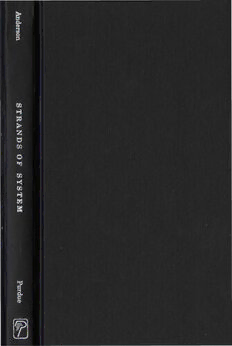
Strands of System: The Philosophy of Charles Peirce PDF
Preview Strands of System: The Philosophy of Charles Peirce
STRANDS OF SYSTEM IPurdueUniversityPressSeries intheHistoryofPhilosophy GeneralEditors ArionKelkel JosephJ. Kockelmans AdriaanPeperzak -CalvinO. Schrag 'Thomas Seebohm STRANDS OF S Y S T E M The Philosophyof Charles Peirce Douglas R. Anderson IPurdue UniversityPress WestLafayette, Indiana Copyright©1995byPurdueResearchFoundation. Allrightsreserved. 99 98 97 96 95 5 4 3 2 1 Thepaperusedinthisbookmeetstheminimumrequirementsof AmericanNationalStandardforInformationSciences-Permanenceof PaperforPrintedLibraryMaterials,ANSIZ39.48-1984. PrintedintheUnitedStatesofAmerica InteriordesignbyAnitaNoble LibraryofCongressCataloging-in-PublicationData Anderson,DouglasR. StrandsofSystem:thephilosophyofCharlesPeirce/ DouglasR.Anderson. p. cm.- (PurdueUniversityPressseriesinthehistoryof philosophy) IncludestextsofPeirce'sworks"Thefixationofbelief"and"A neglectedargumentfortherealityofGod." Includesbibliographicalreferencesandindex. ISBN1-55753-058-0(alk. paper) - ISBN 1-55753-059-9 (pbk:alk. paper) 1.Peirce, CharlesS.(CharlesSanders), 1839-1914. I. Peirce, CharlesS.(CharlesSanders), 1839-1914.Fixationofbelief. II. Peirce, CharlesS.(CharlesSanders), 1839-1914.Neglectedargumentforthe realityofGod. III.Title. IV. Series. B945.P44A874 1995 191--dc20 94-3571 CIP CONTENTSI Vll PREFACE xi NotesonTextsandAbbreviations 1 CHAPTERONE BiographicalSketch 1 ALogician'sLife 11 AnIntellectualCareer 20 HistoricalInterlocutors 26 CHAPTERTWO StrandsofSystem 30 ThePerennialClassification 32 Mathematics 35 Philosophy 68 CHAPTERTHREE TheFixationofBelief 68 Text 82 Commentary 118 CHAPTERFOUR ANeglectedArgumentfortheRealityofGod 118 Text 135 Commentary 187 APPENDIX 193 BIBLIOGRAPHY 199 INDEX PREFACEI WhiletheworkofCharlesSandersPeircehas nowlongbeenrecog- nized as important, its placeinthe developmentofAmericanphi- losophy, and particularlyinthe genealogyofpragmatism, is still beingcarvedout. Withoutquestion, Peircewasinvolvedinthelate nineteenth--eenturyquesttoscientizephilosophy. However,hewas averse to overtly"scientistic" and positivistic approaches to the quest.Hewasopenlyantitheological;yetheretainedsome"cultured bacilli" oftranscendentalism through which religious beliefwas keptaliveinhisworldview(CP, 6.102). Inshort,hiscontributionto the trajectoryofAmericanphilosophywas as complexas his own character. RichardRortyhasrecentlystatedofPeirce:"Hiscontributionto pragmatismwasmerelytohavegivenita name,andtohavestimu- latedJames"(Rorty, 161).Thiswayofputtingit,however,radically underestimatestheextenttowhichthecontentofWilliamJames's pluralismandradicalempiricismwasinfluencedbyPeirce'stychism andtheoryofcognition. ItlikewiseignoresJohnDewey's acquain- tancewithPeirce'sworkandthe strikingsimilaritiestobefoundin their reconceptions ofexperience (see Smith 1992, 17-24). Rorty's commentalsooverlooksPeirce'sactiveengagementfrom 1903until his deathwiththe questionofwhat pragmatismis. Indeed, Peirce projectedtheverypossibilityofa nominalistic,Rorty-likeversionof pragmatism in several ofhis articles as well as in his letters to Dewey. Peirce's contributionto pragmatismseemsto me notonly to have been deeper than Rorty suspects but also significant enoughtorequirethatwekeepPeirce'sworkaliveinourcontempo- raryconversationsaboutwhatpragmatismis andmightbecome. Inthelastfortyyears, there have beenmanyintroductions to thephilosophyofPeirce.Thisseemstomeagoodthing;thecomplexity I vii viii I PREFACE andvarietyofPeirce's workensurethatitcanbeara greatdealof introduction. Becausemanyofthe obvious avenues ofintroduction havealreadybeentaken,Ihavechosenhere,atleastinpart,tofol- Iowasomewhatlessworntrail. Inthefirsttwochapters, Iwilloffer panoramicviews ofPeirce'slife and work. Although such a broad scope mightbe usedinappropriatelyto describe the workofsome thinkers,itwasaperspectivethatPeirceoftentriedtoprovideofhis ownwork,anditsuseherethusreflectsPeirce'sownstyle.Chapters Three andFourinclude commentariesontwoofPeirce'spublished essays:"TheFixationofBelief"and"ANeglectedArgumentforthe RealityofGod."Thefocusofthesecommentariesisthedevelopment of Peirce's conceptionof beliefwithinthe contextofhis architec- tonic. I havechosentheformer essaybecauseofitsfamiliarityand itsprominenceasanexemplarypieceofPeirce'searlyphilosophical work. Itmarksperhapshisfirst directcontributiontothehistoryof pragmatism. I have chosenthe latterbecauseofits unfamiliarity, because ofits attentionto the whole ofthe architectonic, and be- causeitwas amongthelastofthe philosophicalessaysthatPeirce published. Togethertheseessaysprovide a glimpse atboththecon- tinuityandthedevelopmentinPeirce'sthinking;inparticular,they displayanattempttocometogripswiththecentralpragmaticques- tionofhowtocharacterizebelief. Theselectionof"ANeglectedArgumentfortheRealityofGod" mayseemperplexingtosome. Itsovertconcernwithreligiousbelief seems,from certainapproachestoPeirce'sphilosophy,tobeatodds withmuchelsethathewrote. As Iwilltrytoindicateinthe text, I believethis apparenttensionisnota realone. Butbesidesthe rea- sonsIhavealreadyadduced,itseemstomethatthisessaygivesus a good sense ofPeirce's styleintakingtraditional philosophicalis- suesandgivingthemafreshlookfromtheperspectiveofhissystem. Moreover, itcontains an argumentthatPeircehadbeenthinking aboutfor severalyears;toneglectitistoneglecta dimensionofhis workthathetookseriously. InemploYingthe textas anavenue of introduction, I hopeto add a useful angle ofvisionto the studyof Peirce'sphilosophy. Mycommentariesareofferedfromthevantagepointofonewho is alreadyinsidePeirce'sphilosophicalsystem. Thatistosay, I em- ploysYmpatheticreadingsofthetextsthattrytoseefromtheinside whatPeircemighthave beenseeking. This is notto suggest, how- ever, thatPeirce's thinkingisimmune to criticism;indeed, such a notionis entirelyoutside the spiritofhisfallibilistic accountofin- quiry. ForPeirce, one'sfailures canultimatelybe as importantas one's successes. Nor do I pretendto cornerthe market on sYmpa- ixlPREFACE theticinterpretations. Myhopeis ratherto providereaders witha plausibleroutetounderstandingPeirce'swork-aroutethatmight itselfhelpconstituteanappropriatetargetforexternalcriticismsof Peirce'sphilosophy. I amindebtedtothe ColumbiaUniversityLibrariesfor permission to use correspondencefrom the CassiusJacksonKeyser Papers at the Rare Bookand ManuscriptLibrary, ColumbiaUniversity. The Harvard University Department ofPhilosophy has generously grantedpermissiontoquotefromthePeirceCollectiononmicrofilm, andthePeirceEditionProjecthaskindlyallowedmetoemploythe notes and transcriptions ofMaxFisch. I amfurther indebtedto a numberofindividuals.Inparticular,IwouldliketothankChristian KloeselandNathanHouserfortheirhelpinusingmaterials atthe PeirceEditionProject.JosephBrent,HermannDeuser,andMichael Raposa,amongothers,havegivenmeinvaluableassistancethrough commentsonpartsofmymanuscriptandthroughmoregeneraldis- cussionsconcerningPeirce'swork. MycolleagueCarlHausmanhas earnedmydeepestgratitudefor patientlyexaminingthe whole of thetextandforhiswillingnesstoengageinlongconversationscon- cerningPeirceandhisplaceinthetraditionofAmericanphilosophy. Andfinally, mythankstoJamesPawelskiforhis expertassistance inpreparingthemanuscript.Needlesstosay,despitethehelpthese individualsprovided, errorsinfact andjudgmentremainmyown.
